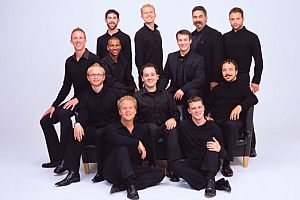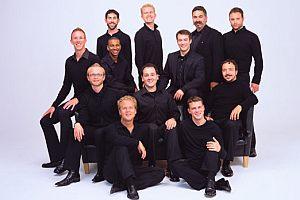
The program, titled “Composers/Our Age,” featured premieres by living (and, in two cases, present) composers Mason Bates, Shawn Crouch, and Tarik O’Regan, all commissioned by Chanticleer as part of its 31st season.
The program, which repeated March 20-22 at the San Francisco Conservatory of Music, was sparsely attended — a shame, since it offered splendid evidence both of Chanticleer’s continued vocal excellence (the group has several new members, all fine additions) and of the quality of music being written by today’s “young” composers. (In an amusing aside, it was revealed that the represented composers were all roughly the same age as Chanticleer — Bates and Crouch were born in 1977, O’Regan in 1978.)
The evidence was particularly strong in the second half’s performance of Bates’ “Sirens,” an arresting 30-minute song cycle cast in six movements. In his prefatory remarks, Bates, now a graduate student at UC Berkeley, said his aim was to explore “the intersection of beauty and danger” embodied in the sirens of Greek mythology. That’s as inviting a premise as any; what Bates has done with it is remarkable. Drawing from an eclectic list of texts — source material as hallowed as Heine’s Die Lorelei and as obscure as South American Quechua poems — the composer creates a sound world of rare seductive beauty.
Bates wastes no time in establishing an atmosphere of enchantment. The cycle starts with an excerpt from Homer’s Odyssey set in a kind of sonic echo chamber, with the voices, pulsing and ecstatic, growing increasingly agitated before yielding to the next movement, a soft, undulating setting of Die Lorelei. Here, Bates animates Heine’s siren, sitting on a rock beside a river — the rippling water, the glint of her golden hair, the irresistible sound of her voice — in an aptly alluring score; the singers invested it with a palpable sense of wonder. The brief but potent third movement — a setting of Pietro Aretino’s Stelle, vostra merce l’eccelse sfere (Stars, thanks to you the lofty spheres) — praises the sirens of heaven in ravishing, long-breathed phrases.
With the long fourth movement, “Sirinu” (Yes, I saw the Siren), Bates departs from everything that has come before. The Quechua text recalls a trancelike vision of a siren, who appears to the narrator in a rain-washed hollow. Intensely rhythmic and otherworldly, the tale is told in song, wordless cries, and whispers, with the singers supplying percussion sounds on handheld shakers.
In Chanticleer’s fervent performance, the music reached out and enveloped the audience. So, too, did the penultimate movement, a radiant setting of text from the Book of Matthew that imbues Jesus’ summoning of the first disciples with the flavor of a siren call. The cycle ended where it began, with a beckoning movement drawn from The Odyssey, sung by the group with poise and precision.
Garden of Horrors
Before intermission, Chanticleer performed Crouch’s The Garden of Paradise. The composer, who introduced the work, incorporates contemporary poems by Iraq war veteran Brian Turner in chants, lullabies, and rhythmic settings, interspersed with chorale settings of texts by 13th-century Persian poet Rumi. There’s a lot going on in the piece, and, despite Chanticleer’s committed advocacy, not all of it cohered. But the central movement, “Sadiq,” which contains Turner’s admonition to an unknown solider (“It should break your heart to kill”), came across with undeniable force.“Composers/Our Age” began with O’Regan’s No Matter. The British composer has devised an appropriately minimalist setting of excerpts from Samuel Beckett’s late-life prose poem “Worstward Ho.” Hearing Beckett’s singular voice divided among the 12 voices of Chanticleer took a little getting used to, but O’Regan’s spare, insistent score proved persuasive in the end.

